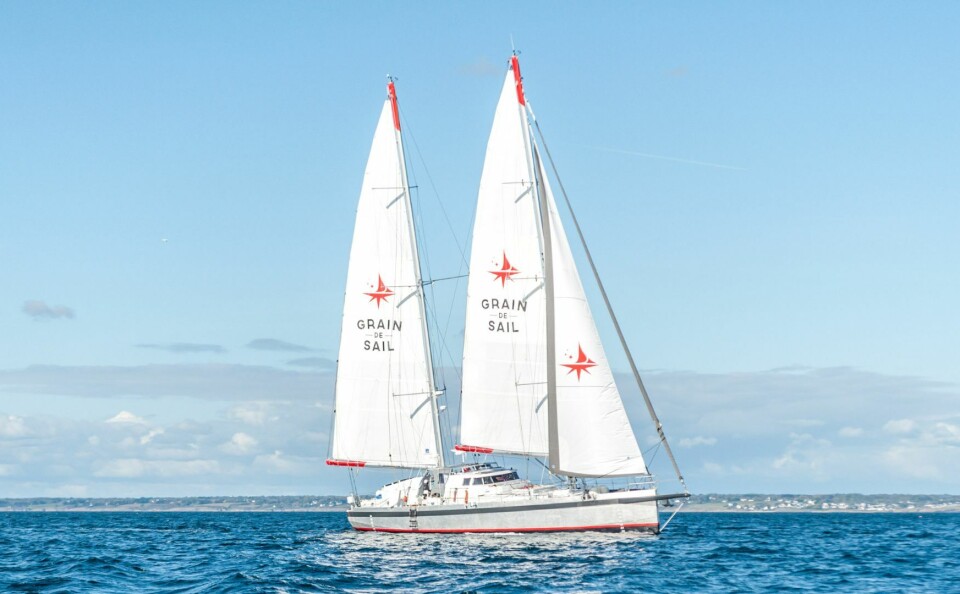-
More communes in France distribute Asian hornet traps
Residents are increasingly receiving help, with now the best time to capture the queens
-
Drinking tap water restricted for children in south-west France communes
Haute Garonne prefecture says the measure is precautionary and due to high chlorate levels
-
France targets imports from South America over banned chemical concerns
Avocados, mangoes, and cherries among food items set to be tested before entry
Green news France: Dordogne recycling, sailboats to ship Channel cargo
We also look at low-carbon parcel delivery in Nice and environmental opposition to hosting the 2030 Winter Olympics

France-UK eco shipping route
Sailboats could return to cross-Channel freight routes in 2024, following the success of commercial Atlantic crossings.
The firm behind the idea, Brittany-based Grain de Sail, has been taking French wines to New York on a specially designed cargo sailboat since 2020, and importing cocoa and coffee from Central America and the Caribbean on the return leg.
With the launch of a new 52-metre boat on the Atlantic route, it plans to deploy its older, smaller vessel in Europe, with a cross-Channel route likely to be first.
“We had an inaugural customer all lined up for an early start in December, but unfortunately they pulled out,” said marketing director Stefan Gallard.
“The timing is a bit unfortunate because bulk freight rates are now lower than they have been for years, but we are determined to push on,” he added.
“Our trans-Atlantic route shows there is a place for small, wind-powered cargo boats which deliver goods with a very small carbon footprint, but essentially for European routes we are starting from scratch.”
Grain de Sail is considering a weekly service between Saint-Malo, where its shipping operations are based, and Southampton.
The crossing time will depend on the weather, but is unlikely to be longer than a day. The boat will take 24 hours to unload and load, before returning to France with a maximum of 26 pallets in its hold and a crew of three.
Read more: Yacht gives holidaymakers green ferry option in France
Doing good in Dordogne
Dordogne association ARTEEC achieves a commendable do-good double, combining eco-responsible recycling activity alongside ‘social insertion’ and job training for the unemployed.
“We have helped 80 people to resume their day-to-day activities, to build a professional project, to regain their self-confidence and to find a sustainable path in which they can flourish,” says a company statement.
The association, based in Marsac-sur-l’Isle, sorts flexible plastic – which can be reprocessed and turned into bin bags – as well as cardboard and polystyrene recycling.
It also runs a ‘ressourcerie’ – a workshop with themes such as thrift shops and book and music libraries.
Its aim is to develop a second-hand consumption model by reselling unwanted objects.
For further information, including how to become a volunteer or employee, please visit their website (French only) or call 05 53 46 65 46.
Low-carbon, high-efficiency deliveries
A forward-thinking Nice (Alpes-Maritimes) logistics company has reimagined its urban delivery process from receipt to destination, in order to reduce its CO2 emissions. The move also alleviates city centre congestion.
Transcan receives parcels at a warehouse before grouping them into ‘quartiers’ (neighbourhoods); they are then transported by electric truck to smaller distribution hubs in the city. Finally the parcels are delivered by electric ‘cargo’ bikes to the customer.
“We had the idea of grouping all parcels in a single vehicle to deliver to the destination customer as well as to the destination district,” Franck Cannata, manager of the transport group, told France 2.
The firm’s streamlined process means that just four full Renault Electric E-Tech trucks replace 100 smaller diesel ones, covering just 100km per day instead of 8,000. Forty cargo bike riders then complete the delivery chain.
Winter Olympics get the cold shoulder
Not everyone is thrilled about the International Olympic Committee’s decision to support France’s bid to host the 2030 winter games in the Alps, with opponents decrying the cost, and the environmental impact of competitor travel and artificial snow use.
Read more: Winter Olympics 2030: France is the only candidate remaining
Fabienne Grebert, chairwoman of the Ecologists group in Auvergne-Rhône-Alpes, said: “It’s a scandal to decide to spend public money without the public’s consent.
“And let’s not kid ourselves: just because these games are going to be held at existing venues doesn’t mean they will be sustainable.
“It’s a financial scandal, a democratic scandal and an environmental scandal.”
Related articles
Bin, forest? How to dispose of your Christmas tree legally in France
New obligatory home waste law in France: Eight tips for composting
Permit granted for sustainable ‘white’ hydrogen search at French site
























